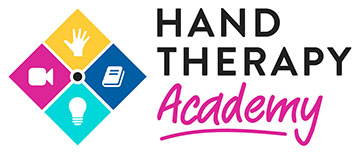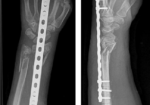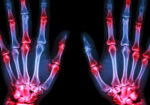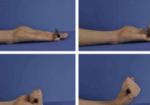An evaluation of wrist and forearm range of motion during purposeful activities and exercises for distal radius fracture
Filed under Reviews
An evaluation of wrist and forearm movement during purposeful activities and range of movement exercises after surgical repair of a distal radius fracture: A randomized crossover study
Collis, J., Mayland, E., Wright-St Clair, V., Rashid, U., Kayes, N., & Signal, N. 2022. An evaluation of wrist and forearm movement during purposeful activities and range of movement exercises after surgical repair of a distal radius fracture: A randomized crossover study, Journal of Hand Therapy, https://doi.org/10.1016/j.jht.2022.07.009
The Skinny
This study investigated how range of motion exercises compared to purposeful activities impact rehabilitation of postoperative distal radius fractures and the movement patterns of the wrist each of the interventions produces.
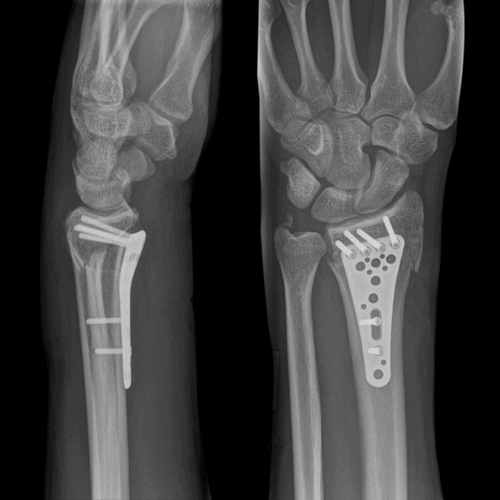
In the Weeds
Thirty-five adults with a surgical repair of a distal radius fracture participated in two ten-minute intervention sessions, including range of motion exercises and meaningful activities that each participant chose the previous day. Electrogoniometers were used to measure four different movement patterns of the wrist during the interventions. These included accumulated joint position over time, maximum active end range, numbers of repetitions, and excursions beyond 75% of available ROM and percentage of active movement time.

Bringing it Home
The purposeful activities required more repetitions, time of movement, and range of movement when compared to range of motion exercises only. The range of motion exercises was significant in providing more accumulation of joint position and end range of movement with supination. These findings suggest that along with other psychosocial benefits of purposeful activities used as therapeutic interventions, these activities also require the affected wrist to move in greater ranges of motion for a longer amount of time, which increases the repetition of wrist movement. This is important for the beginning phases of postoperative rehabilitation for distal radius fractures.
Rating
⅘
Due to the study’s small sample size, the evidence cannot be generalizable. However, this study provided helpful insight for hand therapists to incorporate purposeful and meaningful activities into treatment for the commonly seen diagnosis of distal radius fractures. This article also encourages more research to be done regarding purposeful activities in hand therapy practice.
More To Read
Outcomes of Dorsal Bridging Plates
Outcomes of Dorsal Bridging Plates Fares, A. B., Childs, B. R., Polmear, M. M., Clark, D. M., Nesti, L. J., & Dunn, J. C. (2021). Dorsal Bridge Plate for Distal Radius Fractures: A Systematic Review. The Journal of Hand Surgery. https://doi-org.methodistlibrary.idm.oclc.org/10.1016/j.jhsa.2020.11.026 The Skinny Distal radius fractures (DRF) are a common injury that we see in…
Sensitivity and Specificity in Thoracic Outlet Syndrome (TOS) Tests in Hand Therapy
By: Mikayla Murphy Sensitivity and Specificity in Thoracic Outlet Syndrome (TOS) Tests in Hand Therapy Thoracic outlet syndrome (TOS) describes the compression of nerves, arteries, and veins as they pass through the thoracic outlet. Compression can occur at the interscalene triangle, the costoclavicular triangle, and the subcoracoid space (Physiopedia, n.d.). There are three types of…
Conservative Therapy for OA in the Fingers: A Literature Review
Beasley, J., Ward, L., Knipper-Fisher, K., Hughes, K., Lunsford, D., & Leiras, C. (2018). Conservative therapeutic interventions for osteoarthritic finger joints: A systematic review. Journal of Hand Therapy, 32. 153-164. The Skinny – The article reviews the evidence on the effectiveness of conservative treatment for those who experience osteoarthritis in fingers and in their finger…
Is HEP Just as Good as Therapy for Metacarpal Fracture Rehab?
Gülke, J., Leopold, B., Grözinger, D., Drews, B., Paschke, S., & Wachter, N. J. (2018). Postoperative treatment of metacarpal fractures – Classical physical therapy compared with a home exercise program. Journal of Hand Therapy, 31(1), 20-28. The Skinny – Medicine is moving towards a model that encourages less direct intervention and a more DIY focus…
Sign-up to Get Updates Straight to Your Inbox!
Sign up with us and we will send you regular blog posts on everything hand therapy, notices every time we upload new videos and tutorials, along with handout, protocols, and other useful information.

